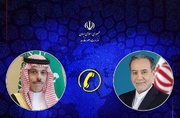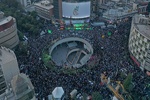As the international community has come to a near-consensus that Syrian crisis should be addressed immediately, recent Russian involvement in Syrian crisis and air strikes against terrorist groups fighting Assad, as Gary Sick, the US former national security adviser believes, has been seen by the European Cold War mentality as a threat which should be opposed immediately. However, as Mr. Sick tells Payman Yazdani of Mehr News International Service, the international community has deserved a credit in coming to a recognition that something had to be done in Syria in order to keep things from falling apart further in the country. The most important change in the composition of Vienna talks has been Russia and Iran, as supporters of Assad government, sitting along with other participants at the table, which Mr. Sick appreciates as a positive step toward a possible solution to Syrian crisis, which he described as very difficult issue to manage with current conditions on place:
Mr. Henry Kissinger, in a recent article in Wall Street Journal, talked about a transition to a new world order. He wrote in the article that “the Westphalian order does not function anymore and we are witnessing at least new ideological wars; can the wars in Iraq, Yemen, Libya and elsewhere in the Middle East be considered as results of such a world order transition?
Well, the reality is that many countries in the Middle East are breaking down, you had basically a civil war in Egypt, which was the result of imposing a dictator, and you have an ongoing civil war in Yemen, there are certain internal disputes in other Middle East countries and of course in Iraq, the country is close to civil war and part of its territory occupied by the ISIS; and of course in Syria, you have the complete breakdown of the state into full-scale civil war. So, in that sense, this certainly represents a transition from a set of old line into something new and that transition is often very combative and bloody. Mr. Kissinger’s solution for that in the book is to say that well, we need a group of senior statesmen capable of doing what was done in 17th century in a Westphalian concept to recreate a set of new states out of disorder; that of course would be desirable, I have no problem with that, but getting there from here is entirely another matter, and actually here, there is no solutions to the practical side of this about how you may make it actually happen and neither there is anybody else’s, as far as I can tell. But in reality, we are going through a major transition period with many states of the region, as I mentioned for you, are experiencing at least a challenge to the existing status quo, and very likely, at the end of this process – nobody knows how long it’ll take – we will see a set of new governments, new ruling elites and perhaps new governing ideas; but at this stage, it’s mostly a categorical collapse, breakdown and warfare.
Can Russian military intervention in Syria create a multipolar situation to pave the way for cooperation of different poles to tackle terrorism?
The Russian entry to Syria was a major shift and does, in fact, create quite new circumstances. One of the problems in dealing with this issue, at least conceptually, is that most of the countries in the west still have a Cold War mentality in terms of any Russian involvement in the Middle East; by definition, it had been dangerous and should be fought, but in this case of course, Russians, at least, they claim that they are involved in fighting ISIS which is in fact what we’re doing. So, what we really have here is a competition of priorities; the Russians are basically saying we should attack ISIS, and then deal diplomatically with the question of Syria and Assad, and the west is still holding firm to the idea that Assad must go either at the same time or before you can deal with ISIS. And this is an important difference and my own view is that ISIS is the most immediate threat, that there is no way we are going to solve the Syrian problem unless ISIS is in fact decided, that all remove a whole set of threats to state system in the region; but at the same time, there should be a diplomatic process going on and indeed that process is going on.
Is there any diplomatic efforts now to tackle the issue?
We just had a series of meetings in Vienna which came up with new ideas about a diplomatic subplot which is looking for a government in Syria that would be inclusive and probably would not include Mr. Assad personally, but which would provide guarantees minority populations including Alawites, Yazidis, Christians, Kurds and other groups and would play some role in the government; that is a very complicated and difficult process, one that is largely shared by different parties in the region; at least diplomatically, they can sit down on a table together. This is something never happened before.
How do you assess Iran participation in ongoing talks on Syria?
In my view, the Russian entry has dramatized the fact that you cannot have solution to the Syrian problem without bringing in Russia and Iran to that equation. At this time, in the last meetings taking place in Vienna, both Russia and Iran were sitting at the table. I think that was a step forward, but nobody would claim that were any place close to a settlement of the political dispute inside Syria. So, from my point of view, getting to any point of stability in Syria does require eliminating ISIS as a factor of civil war, and secondly, basically, having an existing government which may be Assad government, with or without Mr. Assad himself, holding things together while a kind of diplomatic process goes on. That is very hard to do, and I gave, Secretary of State Kerry, Russians, Iran, and Saudis, the credit for recognizing that this cannot go on as has been going on and something seriously needs to be done and sitting down together to begin this process but they were a long way from a solution. That was a positive step to bring Iran into the process. It was necessary to do but it itself cannot solve the problem.
Interview: Payman Yazdani


























Your Comment